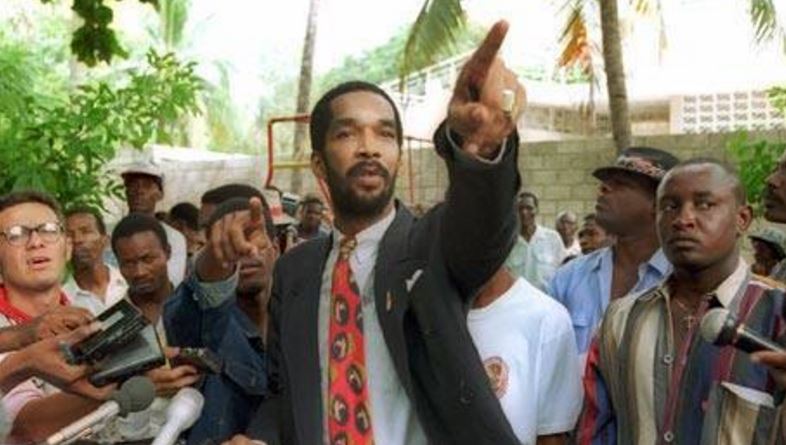During the 1992 U.S. presidential campaign, candidate Bill Clinton had promised to restore democracy to Haiti if elected. Inaugurated in 1993, the administration had to deal with a continuing refugee problem in Florida. Condemning FRAPH and the military regime as nothing more than “armed thugs,” the administration cooperated with a multinational force and dispatched 15,000 troops sent and a high-level negotiating team (Jimmy Carter, Sam Nunn, and Colin Powell) to force the military to step down, restoring Aristide to power in August 1994 after international sanctions and pressure had failed to produce any results. Although the presence of U.S. and UN peacekeepers helped restore calm and security, this success, claims researcher Lisa A. McGowan, was undermined by their refusal to disarm the disbanded Haitian military and paramilitaries. As McGowan wrote,
- “[USAID] is providing funding and technical assistance to strengthen Haiti’s judicial system, yet the U.S. has refused Haitian government requests to deport FRAPH leader Constant, who was imprisoned in the U.S. and wanted in Haiti on murder charges. Instead, the U.S. Justice Department released him from prison. Furthermore, the Clinton administration refuses to give the Haitian government uncensored copies of the documents seized from FRAPH headquarters, raising suspicions that the documents contain incriminating information about CIA and other U.S. collaboration with Haitian paramilitaries. Documents that were obtained revealed, for example, that the CIA knew that Constant was directly implicated in the 1993 murder of Justice Minister Guy Malory, yet kept him on their payroll until the return of Aristide in 1994.”
It subsequently emerged that the US government had, in fact, played a significant role in establishing and funding FRAPH. The investigative journalist Allan Nairn broke the story in an article published in The Nation in 1994. Nairn based his findings on interviews with military, paramilitary and intelligence officials in Haïti and the United States as well as Green Beret commanders and internal documents from the U.S. and Haitian armies. Nairn spoke directly with Constant himself, then being held in a Maryland jail, shortly before he was due to be deported to Haïti. According to Constant, he started the group that became FRAPH at the urging of the Defense Intelligence Agency (DIA), and that even after the U.S. occupation got under way in September 1994, “other people from [his] organization were working with the DIA”, aiding in operations directed against “subversive activities”.
In February 1996, the New York-based Center for Constitutional Rights (CCR) announced that it had obtained thousands of pages of newly declassified U.S. documents, which they claim revealed that the U.S. government recognized the brutal nature of FRAPH but denied it in public. Describing the attitude of US government officials, CCR lawyer Michael Ratner said
- “they were talking out of both sides of their mouth. They were talking about restoring democracy to Haïti, but at the same time, they were undermining democracy in the coup period – at times supporting a group that committed terrorist acts against the Haitian people.”
According to Ratner, U.S. suspicions of Aristide’s leftist populism prodded them to seek support from even the most brutal anti-Aristide elements. Observers such as Ratner, Nairn, and Lisa McGowan have argued that covert assistance to anti-democratic forces such as FRAPH was used to pressure Aristide into abandoning his ambitious program for social reform and adopt harsh economic reforms when the U.S. returned him to power.
According to Bill O’Neil, a consultant for the New York-based National Coalition for Haitian Rights, though the CIA and the Pentagon encouraged FRAPH early on, “within a few weeks or a few months, [U.S. support] was largely jettisoned.” O’Neil, though, expressed concern that the U.S.’s reluctance to completely sever relations with FRAPH until 1995 (when Constant was arrested) may have allowed several high-profile figures to go into hiding.
http://www.williambowles.info/haiti-news/archives/rights_070296.html
